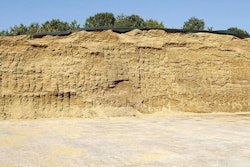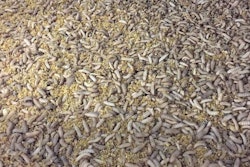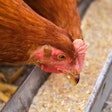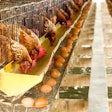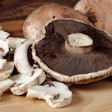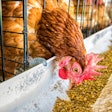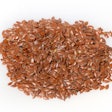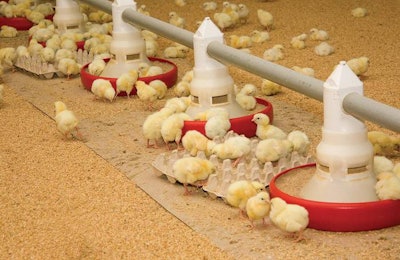
Not all broiler farms produce their own feed. Smaller ones usually purchase ready-made products, whereas medium farms will commission a local feed mill to provide them with feed on demand. In either case, it pays to have a checklist for such purchases. The list below is a first step that looks inside the feed to provide answers that will prevent unpleasant surprises once the feed is consumed. Some questions are harder to answer, but answers do exist for all of them. The best suppliers will have no problem answering these questions.
1. How are cereals ground?
For broilers, cereals should not be ground too finely or too coarsely. In the first instance, the feed becomes more expensive, the birds don’t really benefit, and if fed in meal form the feed will bridge in the silos and stick on the birds’ beaks causing discomfort and a drop in feed intake. In the second case, digestibility will be reduced and feed efficiency index will worsen. Ideally, a medium grind is preferable, but the exact sieve size depends on the cereal type. A qualified nutritionist should be consulted to provide such information.
2. What are the energy and methionine levels?
Knowing protein levels (usually found on feed tags) is barely enough to evaluate any kind of feed. In broilers, the relationship between metabolizable energy and methionine (the first limiting amino acid) is crucial as it determines the rate of growth and carcass fatness. Thus, it is of the highest importance to match these two variables with the genetics used in your farm. A high-end feed supplier should be able to give you the complete amino acid profile, which will help your nutritionist determine if your birds can grow to their genetic potential.
A high-end feed supplier should be able to give you the complete amino acid profile.
3. Is soybean meal quality monitored?
Not all soybean meal products are created equal, even though they may contain the same amount of crude protein. There is considerable thermal processing (cooking) during their manufacturing, and problems can occur both ways: overcooking destroys amino acids, whereas undercooking does not destroy enough of the anti-nutritional factors present in soybeans. There are numerous tests available to evaluate the quality of soybean meal, and your supplier should provide you with records of quality control that assure only the correct quality of soybean meal is used.
4. How hard are the pellets?
If you buy pelleted feed, make sure these pellets are hard enough that there is no breakage during transportation, handling and feeding. The best way to check this is to observe feed pans for fines. Birds prefer pellets to fines, and as such, fines tend to accumulate. Excessive fines accumulation means pellets are not durable enough. Feed mills have an easy way to measure pellet hardness, but if your facilities cause increased pellet breakage, you might want to ask for a pellet binder to be included in your feeds.
5. Which alternative proteins are used?
Soybean meal is not always the least expensive protein source. Many other by-products occasionally become very attractive, and feed mills are enticed to use them to save on cost. But, no such ingredient comes without its own problems, and most likely smaller feed mills lack the know-how when it comes to unconventional feedstuffs. A high concentration of such opportunistic alternative ingredients will cause birds to reduce their feed intake and growth, and in most cases unbalance the feeds, causing feed efficiency to worsen. The usual approach is to limit inclusion levels of such alternative protein sources to "safe" levels of 5 to 10 percent. But, adding two or three such products, each at such low levels, is no guarantee birds will not notice — anti-nutritional factors accumulate and all cause the same effect: reduced animal performance.
6. Are there any animal proteins are used?
Today, there is a movement to all-vegetable diets for broilers. If you belong to this group of producers, you need to ensure ingredients such as fishmeal, poultry meal, animal plasma (in prestarters) and meat meal are not part of your feeds. Although these animal proteins increase feed intake and growth, it is not impossible to create equal products without them. At the end, this is a farm-specific case related to finished product marketing value, and the decision to use these ingredients is a crucial one. In my experience, if you can use them, and the ingredients are of high quality, then they should be used freely to balance the diets properly and maximize feed intake.
7. What additives are included?
This can be the topic of a book, but it suffices to say here “the less, the better.” Otherwise, in my experience, a plethora of additives may indicate lack of confidence in the raw materials used and lack of understanding how to design a successful feed. Each additive should have a purpose, and not all additives are needed in each farm. For example, if you buy a feed based solely on maize, you don’t want to see in there (and pay for) a cereal-type of enzyme. The opposite is true if the diet is based on a mix of barley and wheat. Marketing here plays a very big role, and to this end, small and medium farms should rely on the advice of a qualified nutritionist they trust.
Read more: 5 pointers for profitable broiler production
In conclusion
Buying broiler feed should be no different than buying everything else. It should not be assumed that any supplier knows what is best for your farm. You should have your own quality evaluation criteria and ideally work with a nutritionist to monitor your supplier, the feed you purchase and the animals' performance after they consume it, for at least a few production cycles.


